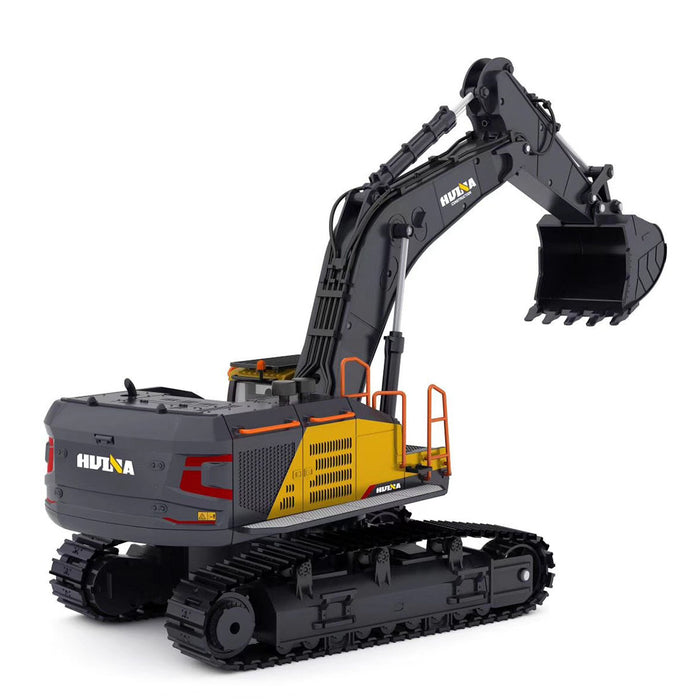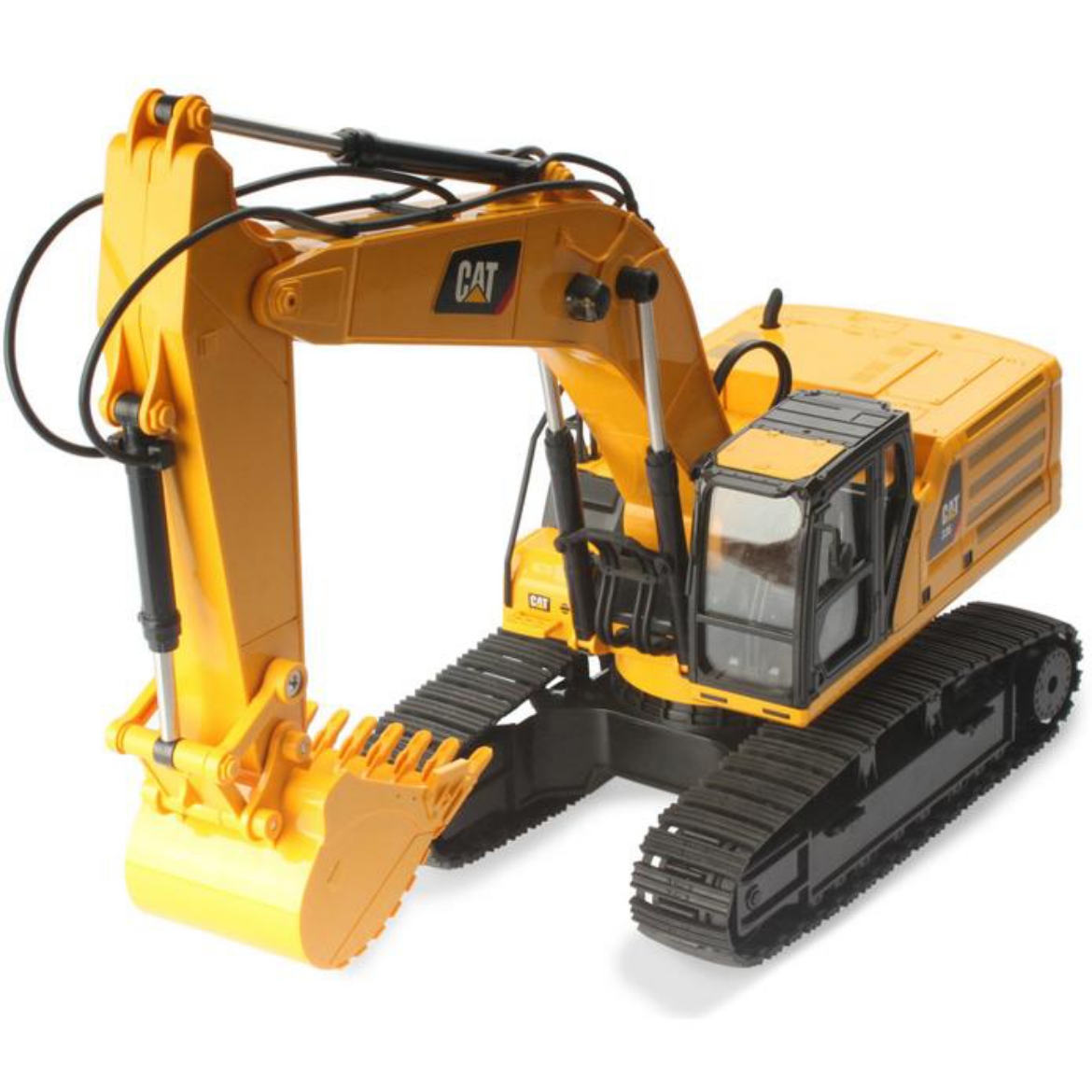Can a rc excavator Save You Time and Money? Here’s How
Wiki Article
Recognizing Just How Excavator Works and Its Influence On Efficiency
Excavators play an essential role in building and construction and mining operations, relying on a complex interaction of mechanical and hydraulic systems. Their capacity to perform a range of tasks depends upon both their style and the technology integrated within. Understanding these parts can considerably influence operational efficiency and performance. As improvements remain to improve the industry, one must think about exactly how these changes will influence future techniques and efficiency.The Fundamentals of Excavator Mechanics

The Function of Hydraulic Systems in Excavators
At the heart of excavator procedure exists the hydraulic system, which plays a critical duty in powering the device's activities and functions. This system makes use of pressurized hydraulic fluid to transfer energy, enabling numerous actions such as moving, excavating, and training. By using the principles of hydraulics, excavators can carry out tasks with remarkable accuracy and pressure, boosting general operational efficiency.The hydraulic system includes essential elements, including pumps, cyndrical tubes, and shutoffs, which collaborate to manage the circulation and direction of the fluid. When the operator involves the controls, the hydraulic fluid is guided to details cylinders, equating the operator's commands into physical movement. This system allows for smooth and responsive actions, which are essential in construction and excavation environments. double e volvo rc excavator. The efficiency of the hydraulic system straight influences the productivity and flexibility of the excavator, making it a vital component in contemporary excavation proceduresSecret Elements of an Excavator
Recognizing the essential parts of an excavator is necessary for realizing just how this effective equipment operates. An excavator contains a number of substantial elements, consisting of the undercarriage, home, container, arm, and boom. The undercarriage supplies stability and movement, commonly including tracks or wheels to navigate numerous terrains. Your home consists of the engine and hydraulic systems, enabling the driver to manage motion and power the equipment. The boom expands from the house, making it possible for upright reach, while the arm connects to the pail, helping with digging and training operations.Additionally, the taxicab houses the driver, geared up with controls for exact maneuvering. Each of these parts plays a crucial function in the excavator's overall performance, adding to its effectiveness and performance on construction websites. Comprehending these parts helps in enhancing and maintaining excavator efficiency, ensuring tasks are finished securely and successfully.Add-on Adaptability and Its Benefits
Attachment convenience is a crucial aspect of excavators, allowing operators to change between various tools tailored for specific tasks. This adaptability not only boosts work effectiveness however likewise adds to cost-effectiveness by minimizing the demand for several machines. Recognizing the various types of attachments available can substantially influence the general efficiency and capability of an excavator on task sites.Kinds of Add-ons
While excavators are mainly acknowledged for their digging capacities, their true versatility depends on the large selection of attachments readily available. These add-ons boost the excavator's performance, enabling it to perform numerous jobs beyond excavation. Usual accessories consist of pails (for excavating and scooping), hydraulic thumbs (for grasping materials), and augers (for piercing holes) Grapples are used for moving and dealing with debris, while rippers can break up hard surface areas. Other specialized attachments, such as plates and plows, make it possible for excavators to adjust to details job demands. This diversity not only enhances the maker's utility across different markets, consisting of landscape design, demolition, and building, yet likewise permits drivers to customize their tools to satisfy details job demands successfully.Raised Work Effectiveness
Maximizing work efficiency is a key advantage of making use of various excavator add-ons. Different attachments enable an excavator to carry out multiple jobs without needing to switch over devices, conserving useful time and labor. For instance, making use of a hydraulic hammer can damage concrete while a container accessory can dig deep into soil, enabling a smooth operations. This adaptability lowers downtime related to equipment changes and enhances efficiency on-site. In addition, specialized attachments boost precision in tasks such as grading or landscape design, leading to better results. The capacity to adapt to numerous work requirements not only streamlines operations yet likewise reduces the need for added machinery, guaranteeing that jobs are finished swiftly and properly. Overall, accessory convenience considerably adds to boosted job efficiency in excavation work.Cost-Effectiveness and Flexibility
Cost-effectiveness is a substantial advantage of using versatile excavator attachments. These add-ons permit a solitary excavator to execute multiple tasks, minimizing the demand for extra machinery and labor - double e volvo rc excavator. By switching between buckets, hammers, and grapples, operators can take on numerous projects, from excavating to demolition, consequently maximizing equipment application. This flexibility not only lowers functional prices yet also reduces downtime connected with altering tools. Furthermore, the ability to tailor excavators with specialized accessories improves efficiency, as they can successfully deal with varied tasks according to project needs. In conclusion, the mix of cost-effectiveness and convenience in excavator add-ons adds to improved operational performance and source appropriation in construction and excavation jobs
Advanced Technology in Modern Excavators
Modern excavators are increasingly equipped with innovative modern technology that transforms excavation processes. Automation simplifies procedures, while enhanced gas efficiency lowers functional prices. In addition, clever control systems enhance accuracy and safety and security, noting a substantial evolution in excavation devices.Automation in Excavation Processes
As excavation innovation develops, automation has actually emerged as a vital component in enhancing efficiency and accuracy on work websites. Modern excavators are furnished with innovative automated systems that assist in jobs such as grading, digging, and trenching with marginal driver intervention. These systems make use of sensing units, GPS, and artificial intelligence algorithms to guarantee precise positioning and deepness control, greatly decreasing the margin for mistake. Additionally, automation allows operators to concentrate on calculated decision-making as opposed to manual controls, resulting in enhanced efficiency overall. Such innovations not only simplify process however likewise improve safety and security by lessening human error in intricate procedures. Subsequently, the integration of automation in excavation procedures represents a considerable innovation in construction technology, driving the industry in the direction of higher performance and efficiency.Improved Fuel Performance
Innovations in modern technology have also caused significant improvements in gas effectiveness for contemporary excavators. Modern equipments are outfitted with advanced engines that optimize power result while minimizing gas consumption. These engines use cutting-edge burning innovations, such as turbocharging and straight fuel shot, to improve efficiency and effectiveness. Furthermore, light-weight products in building reduce overall weight, permitting much less power expense during operation. The intro of variable speed controls More about the author allows drivers to adjust engine performance according to certain tasks, further lessening gas usage. Consequently, these improvements not only lower operational prices however likewise contribute to environmental sustainability by minimizing discharges. Generally, enhanced gas effectiveness in excavators is a vital growth that boosts efficiency and economic feasibility in the construction sector.Smart Control Systems
While operators browse significantly complicated task websites, wise control systems in excavators have actually arised as essential devices for enhancing efficiency and accuracy. These innovative modern technologies utilize formulas and sensing units to monitor various criteria such as load weight, terrain conditions, and operational efficiency. By instantly readjusting hydraulic features, clever systems enhance machine performance, leading to improved performance and minimized endure elements. Additionally, drivers take advantage of intuitive interfaces that provide real-time feedback and diagnostics, enabling notified decision-making. This assimilation of technology not only enhances operations however also decreases human error, adding to more secure work environments. As the building and construction market remains to progress, clever control systems will play an important function fit the future of excavator performance and efficiency.Enhancing Operational Efficiency With Excavators
Excavators play a crucial role in boosting operational efficiency across numerous construction and excavation jobs. Their versatility permits for multiple jobs, consisting of lifting, digging, and product handling, which improves operations and lowers the demand for additional equipment. With powerful hydraulic systems, excavators can do sturdy jobs with accuracy, considerably reducing the moment required to full tasks. The combination of innovative innovation, such as GPS and automated controls, even more enhances their procedure, making it possible for drivers to accomplish higher accuracy and minimize material waste. Furthermore, contemporary excavators are created to eat less gas and minimize emissions, contributing to both expense savings and ecological sustainability. By using excavators successfully, building teams can enhance performance, meet job due dates, and boost total site monitoring. This multifunctionality and performance make excavators important tools in the contemporary construction landscape.The Future of Excavators in Construction and Mining Industries
As the construction and mining markets progress, the future of excavators is poised for significant transformation driven by technological development and transforming operational demands. Developments in automation and expert system are improving excavator capabilities, enabling improved precision and efficiency in procedures. Self-governing excavators are arising, reducing the need for human treatment and reducing the danger of accidents.Moreover, the integration of telematics and IoT innovation allows real-time surveillance of machine efficiency and anticipating maintenance, enhancing uptime. Eco-friendly styles, consisting of electrical and hybrid models, are getting grip, lining up with sustainability objectives within the industry.Additionally, using innovative products and lighter designs enhances fuel effectiveness while maintaining performance criteria. As these trends progress, excavators will certainly play a crucial function in fulfilling the increasing needs for productivity and safety and security in building and mining, eventually changing operational landscapes.Often Asked Concerns
How Do Climate Problems Affect Excavator Efficiency?

Weather conditions significantly affect excavator performance, as rain and mud can hinder traction and security, while severe temperature levels might impact hydraulic systems. Operators has to adapt to these variables to guarantee perfect functionality and security throughout operations.
What Security Measures Should Operators Comply With While Using Excavators?
Safety and security actions for excavator drivers consist of putting on proper individual safety tools, performing pre-operation examinations, guaranteeing correct interaction with ground workers, keeping a secure range from overhanging dangers, and adhering to well-known operational methods to avoid accidents.Just How Typically Should Excavators Be Preserved for Optimum Efficiency?
Excavators should be kept regularly to assure peak efficiency, generally every 250 operating hours or as defined by the maker. Regular checks enhance integrity, prevent unexpected break downs, and extend the life-span of the tools.
What Is the Average Life-span of an Excavator?
The average life-span of an excavator generally ranges from 10,000 to 15,000 hours of procedure. Factors influencing longevity consist of maintenance methods, running problems, and the high quality of the machine itself, affecting total productivity and effectiveness.
Can Excavators Operate on Irregular Surface Effectively?
Excavators home can operate successfully on unequal terrain as a result this of their verbalized designs and adjustable tracks. These functions enable them to preserve stability and traction, making it possible for reliable operation in challenging settings frequently encountered in building and landscaping projects. Each of these parts plays an important duty in the excavator's general performance, contributing to its performance and performance on construction sites. Optimizing task performance is a main advantage of making use of different excavator add-ons. While operators navigate significantly intricate work sites, clever control systems in excavators have actually arised as vital tools for boosting effectiveness and accuracy. Excavators play a necessary role in enhancing functional efficiency throughout different building and excavation tasks. Advancements in automation and fabricated knowledge are improving excavator abilities, enabling for enhanced precision and performance in operations.Report this wiki page